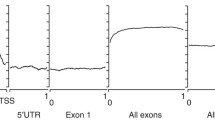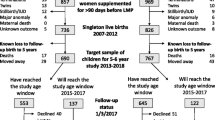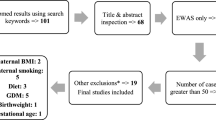Abstract
Purpose
Dietary supplementation with probiotics during pregnancy has been suggested to decrease the risk for obesity in women after delivery and to minimize excessive weight gain in their children. Epigenetic DNA methylation has been proposed to impact on gene activity, thereby providing a plausible molecular mechanism for a broad range of biological processes and diseases. This pilot study aimed to evaluate whether probiotic supplementation during pregnancy could modify the DNA methylation status of the promoters of obesity and weight gain-related genes in mothers and their children.
Methods
A sample of 15 pregnant women was taken from a prospective, randomized mother and infant nutrition and probiotic study. Seven women received the probiotic supplementation and eight served as controls. The women’s and their children’s DNA methylation status of obesity (623 genes) and weight gain-related (433) gene promoters were analyzed from blood samples at the mean of 9.8 months (range 6.1–12.7 months) postpartum.
Results
Probiotic supplementation led to significantly decreased levels of DNA methylation in 37 gene promoters and increased levels of DNA methylation in one gene promoter in women. In their children, 68 gene promoters were significantly affected consistently with a lower level of DNA methylation in the probiotic group.
Conclusions
On the basis of our pilot study, we suggest that probiotic supplementation during pregnancy may affect the DNA methylation status of certain promoters of obesity and weight gain-related genes both in mothers and their children, thereby providing a potential mechanism for long-lasting health effects.

Similar content being viewed by others
References
Zambrano E, Nathanielsz PW (2013) Mechanisms by which maternal obesity programs offspring for obesity: evidence from animal studies. Nutr Rev 71(Suppl 1):S42–S54
Correa A, Marcinkevage J (2013) Prepregnancy obesity and the risk of birth defects: an update. Nutr Rev 71(Suppl 1):S68–S77
Wu GD, Chen J, Hoffmann C, Bittinger K, Chen YY, Keilbaugh SA, Bewtra M, Knights D, Walters WA, Knight R, Sinha R, Gilroy E, Gupta K, Baldassano R, Nessel L, Li H, Bushman FD, Lewis JD (2011) Linking long-term dietary patterns with gut microbial enterotypes. Science 334:105–108
Luoto R, Collado MC, Salminen S, Isolauri E (2013) Reshaping the gut microbiota at an early age: functional impact on obesity risk? Ann Nutr Metab 63(Suppl 2):17–26
Jimenez E, Fernandez L, Marin ML, Martin R, Odriozola JM, Nueno-Palop C, Narbad A, Olivares M, Xaus J, Rodriguez JM (2005) Isolation of commensal bacteria from umbilical cord blood of healthy neonates born by cesarean section. Curr Microbiol 51:270–274
Satokari R, Gronroos T, Laitinen K, Salminen S, Isolauri E (2009) Bifidobacterium and Lactobacillus DNA in the human placenta. Lett Appl Microbiol 48:8–12
Di Gioia D, Aloisio I, Mazzola G, Biavati B (2013) Bifidobacteria: their impact on gut microbiota composition and their applications as probiotics in infants. Appl Microbiol Biotechnol 98:563–577
Ilmonen J, Isolauri E, Poussa T, Laitinen K (2011) Impact of dietary counselling and probiotic intervention on maternal anthropometric measurements during and after pregnancy: a randomized placebo-controlled trial. Clin Nutr 30:156–164
Luoto R, Kalliomaki M, Laitinen K, Isolauri E (2010) The impact of perinatal probiotic intervention on the development of overweight and obesity: follow-up study from birth to 10 years. Int J Obes (Lond) 34:1531–1537
Kirchner H, Osler ME, Krook A, Zierath JR (2012) Epigenetic flexibility in metabolic regulation: disease cause and prevention? Trends Cell Biol 23(5):203–209
Cortese R, Lu L, Yu Y, Ruden D, Claud EC (2016) Epigenome–Microbiome crosstalk: a potential new paradigm influencing neonatal susceptibility to disease. Epigenetics 11:205–215
Piirainen T, Isolauri E, Lagstrom H, Laitinen K (2006) Impact of dietary counselling on nutrient intake during pregnancy: a prospective cohort study. Br J Nutr 96:1095–1104
Laitinen K, Poussa T, Isolauri E, Nutrition, Allergy, Mucosal Immunology and Intestinal Microbiota Group (2009) Probiotics and dietary counselling contribute to glucose regulation during and after pregnancy: a randomised controlled trial. Br J Nutr 101:1679–1687
Glier MB, Green TJ, Devlin AM (2014) Methyl nutrients, DNA methylation, and cardiovascular disease. Mol Nutr Food Res 58:172–182
El-Sayed Moustafa JS, Froguel P (2013) From obesity genetics to the future of personalized obesity therapy. Nat Rev Endocrinol 9:402–413
Kadooka Y, Sato M, Ogawa A, Miyoshi M, Uenishi H, Ogawa H, Ikuyama K, Kagoshima M, Tsuchida T (2013) Effect of Lactobacillus gasseri SBT2055 in fermented milk on abdominal adiposity in adults in a randomised controlled trial. Br J Nutr 110:1696–1703
Asemi Z, Samimi M, Tabassi Z, Naghibi Rad M, Rahimi Foroushani A, Khorammian H, Esmaillzadeh A (2013) Effect of daily consumption of probiotic yoghurt on insulin resistance in pregnant women: a randomized controlled trial. Eur J Clin Nutr 67:71–74
Iemoli E, Trabattoni D, Parisotto S, Borgonovo L, Toscano M, Rizzardini G, Clerici M, Ricci E, Fusi A, De Vecchi E, Piconi S, Drago L (2012) Probiotics reduce gut microbial translocation and improve adult atopic dermatitis. J Clin Gastroenterol 46 Suppl:S33–S40
Kalliomaki M, Salminen S, Arvilommi H, Kero P, Koskinen P, Isolauri E (2001) Probiotics in primary prevention of atopic disease: a randomised placebo-controlled trial. Lancet 357:1076–1079
Singh A, Hacini-Rachinel F, Gosoniu ML, Bourdeau T, Holvoet S, Doucet-Ladeveze R, Beaumont M, Mercenier A, Nutten S (2013) Immune-modulatory effect of probiotic Bifidobacterium lactis NCC2818 in individuals suffering from seasonal allergic rhinitis to grass pollen: an exploratory, randomized, placebo-controlled clinical trial. Eur J Clin Nutr 67:161–167
Yeo GS, Heisler LK (2012) Unraveling the brain regulation of appetite: lessons from genetics. Nat Neurosci 15:1343–1349
Qi Q, Downer MK, Kilpelainen TO, Taal HR, Barton SJ, Ntalla I, Standl M, Boraska V, Huikari V, Kiefte-de Jong JC, Korner A, Lakka TA, Liu G, Magnusson J, Okuda M, Raitakari O, Richmond R, Scott RA, Bailey ME, Scheuermann K, Holloway JW, Inskip H, Isasi CR, Mossavar-Rahmani Y, Jaddoe VW, Laitinen J, Lindi V, Melen E, Pitsiladis Y, Pitkanen N, Snieder H, Heinrich J, Timpson NJ, Wang T, Yuji H, Zeggini E, Dedoussis GV, Kaplan RC, Wylie-Rosett J, Loos RJ, Hu FB, Qi L (2015) Dietary intake, FTO genetic variants, and adiposity: a combined analysis of over 16,000 children and adolescents. Diabetes 64:2467–2476
Claussnitzer M, Dankel SN, Kim KH, Quon G, Meuleman W, Haugen C, Glunk V, Sousa IS, Beaudry JL, Puviindran V, Abdennur NA, Liu J, Svensson PA, Hsu YH, Drucker DJ, Mellgren G, Hui CC, Hauner H, Kellis M (2015) FTO obesity variant circuitry and adipocyte browning in humans. N Engl J Med 373:895–907
Berulava T, Ziehe M, Klein-Hitpass L, Mladenov E, Thomale J, Ruther U, Horsthemke B (2013) FTO levels affect RNA modification and the transcriptome. Eur J Hum Genet 21:317–323
Zhou Y, Simmons D, Lai D, Hambly BD, McLachlan CS (2017) rs9939609 FTO genotype associations with FTO methylation level influences body mass and telomere length in an Australian rural population. Int J Obes (Lond). https://doi.org/10.1038/ijo.2017.127
Nowacka-Woszuk J, Pruszynska-Oszmalek E, Szydlowski M, Szczerbal I (2017) Nutrition modulates Fto and Irx3 gene transcript levels, but does not alter their DNA methylation profiles in rat white adipose tissues. Gene 610:44–48
Rovite V, Petrovska R, Vaivade I, Kalnina I, Fridmanis D, Zaharenko L, Peculis R, Pirags V, Schioth HB, Klovins J (2014) The role of common and rare MC4R variants and FTO polymorphisms in extreme form of obesity. Mol Biol Rep 41:1491–1500
Fani L, Bak S, Delhanty P, van Rossum EF, van den Akker EL (2014) The melanocortin-4 receptor as target for obesity treatment: a systematic review of emerging pharmacological therapeutic options. Int J Obes (Lond) 38:163–169
Rajwani A, Ezzat V, Smith J, Yuldasheva NY, Duncan ER, Gage M, Cubbon RM, Kahn MB, Imrie H, Abbas A, Viswambharan H, Aziz A, Sukumar P, Vidal-Puig A, Sethi JK, Xuan S, Shah AM, Grant PJ, Porter KE, Kearney MT, Wheatcroft SB (2012) Increasing circulating IGFBP1 levels improves insulin sensitivity, promotes nitric oxide production, lowers blood pressure, and protects against atherosclerosis. Diabetes 61:915–924
Koutsaki M, Sifakis S, Zaravinos A, Koutroulakis D, Koukoura O, Spandidos DA (2011) Decreased placental expression of hPGH, IGF-I and IGFBP-1 in pregnancies complicated by fetal growth restriction. Growth Horm IGF Res 21:31–36
Styskal J, Nwagwu FA, Watkins YN, Liang H, Richardson A, Musi N, Salmon AB (2013) Methionine sulfoxide reductase A affects insulin resistance by protecting insulin receptor function. Free Radic Biol Med 56:123–132
Ge D, Gooljar SB, Kyriakou T, Collins LJ, Swaminathan R, Snieder H, Spector TD, O’Dell SD (2008) Association of common JAK2 variants with body fat, insulin sensitivity and lipid profile. Obesity (Silver Spring) 16:492–496
Fisman EZ, Tenenbaum A (2010) The ubiquitous interleukin-6: a time for reappraisal. Cardiovasc Diabetol 9:62–2840
Hruz P, Dann SM, Eckmann L (2010) STAT3 and its activators in intestinal defense and mucosal homeostasis. Curr Opin Gastroenterol 26:109–115
Vijay-Kumar M, Aitken JD, Carvalho FA, Cullender TC, Mwangi S, Srinivasan S, Sitaraman SV, Knight R, Ley RE, Gewirtz AT (2010) Metabolic syndrome and altered gut microbiota in mice lacking Toll-like receptor 5. Science 328:228–231
Smith TJ, Rigassio-Radler D, Denmark R, Haley T, Touger-Decker R (2013) Effect of Lactobacillus rhamnosus LGG(R) and Bifidobacterium animalis ssp. lactis BB-12(R) on health-related quality of life in college students affected by upper respiratory infections. Br J Nutr 109:1999–2007
Johnston BC, Ma SS, Goldenberg JZ, Thorlund K, Vandvik PO, Loeb M, Guyatt GH (2012) Probiotics for the prevention of Clostridium difficile-associated diarrhea: a systematic review and meta-analysis. Ann Intern Med 157:878–888
Jakaitis BM, Denning PW (2014) Commensal and probiotic bacteria may prevent NEC by maturing intestinal host defenses. Pathophysiology 21:47–54
Barker DJ, Winter PD, Osmond C, Margetts B, Simmonds SJ (1989) Weight in infancy and death from ischaemic heart disease. Lancet 2:577–580
Hales CN, Barker DJ, Clark PM, Cox LJ, Fall C, Osmond C, Winter PD (1991) Fetal and infant growth and impaired glucose tolerance at age 64. BMJ 303:1019–1022
Brenseke B, Prater MR, Bahamonde J, Gutierrez JC (2013) Current thoughts on maternal nutrition and fetal programming of the metabolic syndrome. J Pregnancy 2013:368461
Acknowledgements
The present study was supported by the grants from the Social Insurance Institution of Finland, the Päivikki and Sakari Sohlberg Foundation, the Jenny and Antti Wihuri Foundation (personal grant to S. V.), the Juho Vainio Foundation (personal grant to S. V.), and Finnish Cultural Foundation the Varsinais-Suomi Regional Fund (personal grant to S.V.) The Turku Centre for Biotechnology was funded by Biocenter Finland, University of Turku and Åbo Akademi. The food products were provided by Raisio plc (Raisio), but the company had no influence on the design or reporting of the study. Furthermore, we would like to thank our two research nurse, Ulla-Maija Eriksson for the clinical work she conducted with the study subjects and Satu Leinonen for her technical assistance.
Author information
Authors and Affiliations
Corresponding author
Ethics declarations
Conflict of interest
None of the authors have any conflict of interest to declare.
Authorship
The authors’ responsibilities were as follows: SV, KL, EI, and SS designed the research and SV, KL, EI, SS, RL, and AL conducted the research. All of the authors participated in the preparation of the manuscript and are responsible for the final content.
Rights and permissions
About this article
Cite this article
Vähämiko, S., Laiho, A., Lund, R. et al. The impact of probiotic supplementation during pregnancy on DNA methylation of obesity-related genes in mothers and their children. Eur J Nutr 58, 367–377 (2019). https://doi.org/10.1007/s00394-017-1601-1
Received:
Accepted:
Published:
Issue Date:
DOI: https://doi.org/10.1007/s00394-017-1601-1




